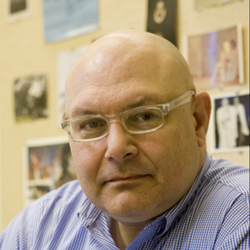Lawrence Venuti: Distinguished Lecturer in Multilingualism and Language Learning

When:
Wednesday, December 5, 2018
3:00 PM - 6:00 PM CT
Where: Norris University Center, 202, 1999 Campus Drive, Evanston, IL 60208 map it
Audience: Faculty/Staff - Student - Public - Post Docs/Docs - Graduate Students
Contact:
Irene Sakk
(847) 491-7020
Group: Linguistics Department
Co-Sponsor:
Alice Kaplan Institute for the Humanities
Category: Academic
Description:
Traduttore Traditore: The Instrumentalism of Conventional Wisdom
Since antiquity, regardless of time and place, language and culture, the discourse on translation has been mired in clichés. The cliché may be a dichotomy indicating opposed translation strategies. Perhaps the most famous example is European, “word-for-word” vs. “sense-for-sense,” which dates back to Cicero’s De optimo genere oratorum (46 BCE) but is decisively formulated in Jerome’s Epistula LVII (395CE). Similar dichotomies occur in Asian cultures as well, such as “unhewn” vs. “refined,” which is reported to have appeared in Zhi Qian’s preface to his Chinese version of the Buddhist sutra, Dharmapada (third century CE).
The cliché may also develop into a fully-fledged proverb about translation, a pithy statement that is believed to encapsulate an accepted truth and therefore to be worthy of repeated application, whether in elite or in popular cultures. Here belong catchphrases like “traduttore traditore” (1539) and Robert Frost’s “poetry is what gets lost in translation” (1959). Even Jacques Derrida’s paradox--“Rein n’est intraduisible en un sens, mais en un autre sens tout est intraduisible” (1996)--has now been used so many times as to have become a theoretical chestnut. These discursive phenomena indicate not only that translation has long been the site of rote thinking, but also that it has been grounded on an instrumental model in which it is understood as the reproduction or transfer of an invariant contained in or caused by the source text, an invariant form, meaning, and effect.
My lecture initiates a rigorous interrogation of proverbial expressions where instrumentalism continues to limit translation commentary. I will start with an examination of the proverb as a genre that is metaphorical and then return a particular translation proverb--“traduttore traditore”--to various contexts where it has been used, both originary and subsequent. The first published use of this proverb seems to have been a sixteenth-century Italian satire, whereafter it was developed in French by sixteenth-century authors, notably the poet Joachim du Bellay. Modern uses examined in the lecture include: a 1929 letter to the editor of the London Times about international business transactions; John Frederick Nims’s 1952 review of Roy Campbell’s translation of San Juan de la Cruz’s poetry for Poetry magazine; Roman Jakobson’s 1959 essay, “On Linguistic Aspects of Translation”; and Arthur Sze’s introduction to his 2001 collection, Silk Dragon: Translations from the Chinese.
The discussion explores how instrumentalism preempts an understanding of translation as an interpretive act that inevitably varies source-text form, meaning, and effect even when the translator maintains a semantic correspondence and a stylistic approximation. At the same time, instrumentalism restricts the definition of the translator’s linguistic competence and leads to notions of untranslatability. Yet if translation is indeed an interpretation, no text is untranslatable since every text can be interpreted. My aim is to defamiliarize notions that have come to be all too familiar as truths of translation, to show how they actually limit thinking about what translation is and does, and to indicate other, more productive directions that thinking can take.